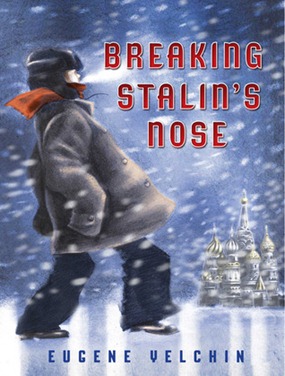Reviews of the 2012 Newbery winners
Winner: Dead End in Norvelt by Jack Gantos (Farrar)
Starred review in The Horn Book Magazine, September/October 2011
Who but Jack Gantos would get a summer job typing up obituaries for his arthritic neighbor, the town’s unofficial historian; have a best friend who “grew up in a house full of dead people”; and need to nurse a tender nose that sprays blood like “dragon flames”? And since “Death is not a lazy fellow” in 1962 Norvelt, Pennsylvania, Jack’s summer job keeps him busy.
 Winner: Dead End in Norvelt by Jack Gantos (Farrar)
Winner: Dead End in Norvelt by Jack Gantos (Farrar)Starred review in The Horn Book Magazine, September/October 2011
Who but Jack Gantos would get a summer job typing up obituaries for his arthritic neighbor, the town’s unofficial historian; have a best friend who “grew up in a house full of dead people”; and need to nurse a tender nose that sprays blood like “dragon flames”? And since “Death is not a lazy fellow” in 1962 Norvelt, Pennsylvania, Jack’s summer job keeps him busy. The elderly citizens of this town founded by Eleanor Roosevelt are dropping like flies, and Jack’s obituaries chronicle the history of the community, which Jack says could be a “museum of freaks.” Miss Volker cooks her arthritic hands in hot wax, old Mr. Spizz rides through town on a giant tricycle, Bob Fenton looks like “a human corn grub with crusty wire rimmed glasses over his bugged-out snow globe eyes,” and Jack’s own father is building a bomb shelter and landing strip in the cornfield. But there’s more than laugh-out-loud gothic comedy here. This is a richly layered semi-autobiographical tale, an ode to a time and place, to history and the power of reading. And after a summer spent reading Landmark biographies and learning from Miss Volker (a kindred spirit of Peck’s Grandma Dowdel), Jack has changed. He realizes he can learn from history; he doesn’t have to keep doing “stupid stuff.” Readers will see in this story the wellspring of Gantos’s earlier characters Joey Pigza and Jack Henry, but readers of Hole in My Life (rev. 5/02) will know that history does have a way of repeating itself, and doing stupid stuff is not just for the young. DEAN SCHNEIDER
 Honor: Inside Out & Back Again by Thanhaa Lai (HarperCollins/Harper)
Honor: Inside Out & Back Again by Thanhaa Lai (HarperCollins/Harper)Review in The Horn Book Magazine, March/April 2011
Recounting events that resemble her own family’s 1975 flight from Saigon and first months in the United States, Lai pens a novel in vividly imagined verse. Each brief poem encapsulates a mood and experience of that year. As the Vietnam War nears its end in April, ten-year-old Ha’s “Birthday Wishes” include “Wish Mother would stop / chiding me to stay calm / which makes it worse” and that “Father [who’s missing in action] would come home”; on August 29, registering for school in Alabama, “a woman who / pats my head / while shaking her own. / I step back, / hating pity, /…the pity giver / feels better, / never the pity receiver.” Such condescension is new to Ha and her brothers, all excellent students, as is being daunted by challenges like the urgent need to master idiosyncratic English. Meanwhile, Brother Vu takes odd jobs; Quang (who once said, “One cannot justify war / unless each side / flaunts its own / blind conviction”) repairs cars. Many neighbors and classmates, with their own blind convictions, are cruelly antagonistic, but Ha soon finds allies at school and in English-tutor Ms. Washington. Lai’s spare language captures the sensory disorientation of changing cultures as well as a refugee’s complex emotions and kaleidoscopic loyalties. That Ms. Washington’s son died in Vietnam underlines the disparity between nations’ quarrels and their citizens’ humanity, suggesting this as a provocative companion to Katherine Paterson’s Park’s Quest (rev. 7/88). JOANNA RUDGE LONG
 Honor: Breaking Stalin's Nose by Eugene Yelchin (Holt)
Honor: Breaking Stalin's Nose by Eugene Yelchin (Holt)Starred review in The Horn Book Magazine, September/October 2011
It would be hard to find a boy more excited about becoming a Young Pioneer than ten-year-old Sasha Zaichik. While some kids might love soccer or baseball, Sasha loves Stalin and the Communist party. He embraces life in his crowded communal apartment; he doesn’t even mind knowing the intimate details of his neighbors’ eating and bathroom habits. Sasha is especially proud of his father, a hero and a member of the secret police, dedicated to catching enemies every day. It doesn’t take long for cracks to appear in the veneer of Sasha’s view of the world, however. First, his father is arrested in the middle of the night, leaving the boy alone. Sasha hangs on to his illusions until he cannot help but face the dreadful facts: he will not become a Young Pioneer, he is now a pariah at school, his father is not coming back, and his dream of meeting Stalin is dashed. For most middle graders, the history of Stalinist oppression will be new information, and this story is a start at filling in the blanks. Like Antonio Skármeta’s picture book The Composition, this brief novel gets at the heart of a society that asks its citizens, even its children, to report on relatives and friends. Appropriately menacing illustrations by first-time novelist Yelchin add a sinister tone. Although the story takes place over just a few days, it is well paced, peeling off the layers of Sasha’s naivete to show him—and young readers—the cynicism of the system he trusted. ROBIN L. SMITH
says
says
Add Comment :-
RELATED
RECOMMENDED
ALREADY A SUBSCRIBER? LOG IN
We are currently offering this content for free. Sign up now to activate your personal profile, where you can save articles for future viewing.







